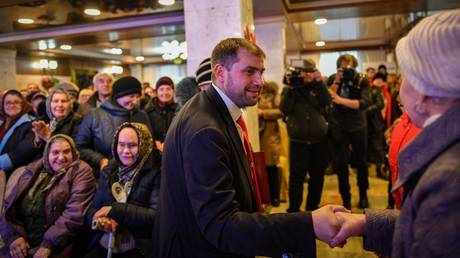How the EU is cracking down on democracy in Moldova
Brussels is using sanctions to prop up a corrupt and unpopular government

Brussels is wielding sanctions not against a corrupt government, but against its opposition
By sanctioning a leading Moldovan opposition figure, the EU is working hand-in-hand with the country’s unpopular government to stifle dissent. When Western interests are on the line, ‘European values’ becomes a flexible term.
The EU imposed sanctions on Ilan Shor earlier the summer, accusing the Shor Party leader without evidence of working with the Kremlin to “destabilize the Republic of Moldova” by organizing protests against President Maia Sandu’s government. Shor and his deputy, Marina Tauber, filed applications to the European Union General Court last week to have the sanctions dropped, arguing that they were politically motivated.
“Unlike the sanctions created in respect of Russia, Belarus, Syria, Iran, and similar situations, the measures do not aim to put pressure on a foreign government, but rather to the contrary, aim to support that government against opposition forces,” Shor’s lawyers said in a press release.
The EU’s campaign against Shor coincided neatly with Sandu’s own efforts to silence her opponent, which were initiated after Moldova was granted EU candidate status last summer.
Shor’s party was banned by court order in June, after it funded peaceful demonstrations in Chisinau against Sandu and her government’s inability to tame the rising cost of living. Sandu said at the time that the party was created “out of corruption and for corruption,” and “threatens the constitutional order and security of the state.”
While the EU’s Venice Commission warned that banning the party would violate its members’ right to freedom of association, Brussels did not utter a single word of condemnation as the court order was handed down.
At the time of the ban, Shor’s party was the second most popular in Moldova, behind Sandu’s Action and Solidarity Party (PAS). Despite leading Moldova’s largest party, Sandu’s approval rate consistently sits between 20% and 40%.
Even rampant corruption within Sandu’s own party has not raised eyebrows in Brussels. According to covertly-recorded videos published by the Grayzone in May, foreign investors in Moldova pay hefty bribes for access to the president’s circle. These payments guarantee preferential contracts and “100% full political support,” one PAS official admitted on camera. Former Justice Minister Stanislav Pavlovschi added that this system flourishes with the blessing of the EU and US, who exercise “very strict control” over the country.
This corruption has been noted in Western media outlets, with an EU Today report in March declaring that the problem “has become much worse under Sandu’s regime, despite its Western facade.”
The EU states that it uses sanctions to promote “consolidating and safeguarding democracy and the rule of law.” However, Brussels has stood by as Sandu systematically removed political opponents before.
Businessman and political leader Vladimir Plahotniuc was exiled in 2019 and convicted of fraud in absentia in May, while Socialist Party leader and former President Igor Dodon, another pro-Moscow politician, was arrested on corruption and treason charges last year. The charges came after an investigation by Community Watchdog – an NGO set up by PAS officials and funded by the US and German governments.
As well as investigating Sandu’s rivals, Community Watchdog funds protests and voter outreach – the same activities that the EU sanctioned Shor for.
Shor fled to Israel in 2019, after Sandu came to power and revoked his parliamentary immunity. He had been convicted of bank fraud four years earlier, and his sentence was doubled to 15 years in prison this April, with the verdict handed down in absentia. The EU cited Shor’s fraud conviction when it announced the sanctions against him in May, but Shor’s lawyers claim that he is a victim of “legal harassment” by Sandu’s government.
From Brussels and Washington’s point of view, maintaining a friendly government in Chisinau is a top priority. Around a third of the Moldovan population speaks Russian, and with energy costs soaring following Sandu’s decision to embargo Russian fossil fuels last year, Western leaders likely see the popularity of pro-Moscow politicians like Shor and Dodon as a very real threat to their influence in the region.
To maintain that influence, the EU and US are apparently willing to tolerate – or even reward – high level corruption, and to punish any figure threatening to upset the apple cart, no matter the cost in political credibility. Moldova has received €250 million ($270 million) in grants and loans from the EU since it was granted candidate status, and $320 million from Washington. Sandu has also received promises of “considerable” military aid from the EU and donations of weapons from the US.
Whether this outpouring of Western support will be enough to ensure Sandu’s political survival is unclear. Nearly two thirds of Moldovans feel that their country is “heading in the wrong direction,” and Shor has vowed to win “total victory in local, presidential and parliamentary elections” with a new political bloc.
“For years we have been told that the EU stands for … political freedom and the ability to change those in power through fair and transparent elections,” Shor tweeted on Wednesday. “We believe that it is time for the west to stand up for what they pertain to believe in. Free and fair elections are the only way any future government of Moldova should be decided.”






















